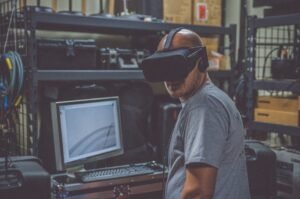What Is the Most Advanced AI Right Now?
Artificial Intelligence (AI) has rapidly advanced in recent years, revolutionizing various industries and transforming the way we live and work. With breakthroughs in machine learning and neural networks, the development of increasingly advanced AI systems has become possible. But what is the most advanced AI right now? Let’s explore the cutting-edge innovations and achievements in AI technology!
Key Takeaways
- AI powers significant advancements in various industries.
- Machine learning and neural networks are driving AI development.
- The most advanced AI systems are capable of performing complex tasks.
- AI technology continues to evolve rapidly.
Currently, the most advanced AI systems can perform a wide range of tasks with high efficiency and accuracy. These systems are designed to replicate cognitive functions performed by humans, such as learning, reasoning, problem-solving, and decision-making. One exciting field within AI is natural language processing (NLP), which enables computers to understand and interpret human language.
One such remarkable AI system is GPT-3 (Generative Pre-trained Transformer 3), developed by OpenAI. GPT-3 is a language-processing AI model that has attracted significant attention due to its astonishing capabilities. It has been trained on an enormous amount of data and can perform tasks like writing essays, creating code, simulating human conversation, and much more.
Applications of Advanced AI
Advanced AI technologies find applications in various fields, revolutionizing industries and enhancing human capabilities. Some notable domains where advanced AI is making significant contributions include:
- Healthcare: AI-powered systems assist doctors in diagnosing diseases, analyzing medical images, and discovering new treatments.
- Finance: AI algorithms enable risk analysis, fraud detection, algorithmic trading, and personalized financial services.
- Autonomous Vehicles: AI plays a crucial role in self-driving cars by processing sensor data, making real-time decisions, and ensuring safe navigation.
- Smart Assistants: AI-powered virtual assistants like Siri and Alexa use natural language understanding to respond to user queries and perform tasks.
Advancements in AI Research
Researchers and organizations worldwide are continually pushing the boundaries of AI technology through innovative breakthroughs and advancements. Here are some notable achievements in the field of AI:
| AI Milestone | Year |
|---|---|
| IBM’s Deep Blue defeats world chess champion Garry Kasparov | 1997 |
| Google’s AlphaGo defeats Go world champion Lee Sedol | 2016 |
| Microsoft’s XiaoIce chatbot interacts with millions of users in China | 2014 |
| OpenAI’s GPT-3 generates human-like text | 2020 |
In recent years, the rise of AI has led to significant interest and investment from tech giants such as Google, Microsoft, Facebook, and Amazon. These companies are actively involved in AI research and development, striving to create more advanced and capable AI systems that push the boundaries of what is possible.
The Road Ahead for AI
The advancements in AI technology are showing no signs of slowing down. As research and investment continue to pour into the field, we can expect even more groundbreaking innovations in the future. The potential applications of AI are vast, ranging from robotics and predictive analytics to automated customer service and personalized medicine.
AI is poised to shape the future, revolutionizing industries, and transforming the way we live and work. With ongoing advancements and breakthroughs, the most advanced AI today may soon be surpassed by even more sophisticated systems in the years to come.

Common Misconceptions
1. AI is on the verge of surpassing human intelligence
One common misconception about the most advanced AI right now is that it is on the brink of surpassing human intelligence. While AI has made significant advancements in various fields, it is still far from reaching human-level intelligence.
- AI lacks common sense and intuition, which humans possess.
- Current AI models can only perform specific tasks and lack the ability to generalize knowledge like humans.
- The complexity of human cognition and consciousness is not yet fully understood and replicating it in AI remains a challenge.
2. AI can fully replace human jobs
Another misconception surrounding the most advanced AI is that it can fully replace human jobs. While AI has the potential to automate certain tasks, complete replacement of humans in all roles is unlikely.
- Many jobs require complex decision-making, creativity, and emotional intelligence, which are difficult for AI to replicate.
- AI is more effective when it complements human capabilities rather than completely replacing them.
- The integration of AI often leads to the creation of new job roles and opportunities rather than eliminating them.
3. AI is always unbiased and objective
There is a misconception that AI is always unbiased and objective in its decision-making process. However, AI systems are only as unbiased as the data they are trained on and the algorithms used.
- Biases present in the training data can lead to biased AI outcomes, reflecting existing societal biases.
- AI algorithms can reinforce or amplify biases if not carefully monitored and regularly evaluated.
- Ensuring fairness and avoiding discrimination in AI models requires conscious efforts and constant improvements.
4. AI poses an immediate existential threat to humanity
Despite popular belief, the most advanced AI right now does not pose an immediate existential threat to humanity. This misconception often stems from science fiction portrayals of AI.
- AI development is guided by ethical considerations and frameworks to mitigate risks and ensure human safety.
- Researchers and organizations actively work on developing AI aligned with human values and interests.
- AI is a tool that remains under human control, and its deployment is subject to regulation and monitoring.
5. AI is a singular entity with general intelligence
Many people mistakenly think that the most advanced AI is a singular entity possessing general intelligence similar to humans. However, AI is a diverse field with various specialized models and systems.
- Current AI models excel in narrow domains but lack the broad range of capabilities exhibited by humans.
- AI systems are often designed to perform specific tasks, such as image recognition or natural language processing.
- Building a single AI system with comprehensive general intelligence is a complex and ongoing pursuit.

The Evolution of AI
Artificial Intelligence (AI) technology has rapidly advanced in recent years, transforming various industries and revolutionizing the way we live and work. From virtual assistants to self-driving cars, AI has made remarkable progress. Here we showcase some of the most advanced AI technologies available today.
AI-Powered Voice Assistants
Voice assistants have become a common feature in our households. These AI-powered devices, such as Amazon Echo’s Alexa, Google Assistant, and Apple’s Siri, provide us with personalized assistance and can perform various tasks, from setting reminders to playing music.
Deep Learning Neural Networks
Deep learning neural networks have significantly contributed to the advancement of AI. These complex algorithms are capable of analyzing large amounts of data, enabling machines to recognize patterns, make predictions, and achieve human-like performance in image recognition and natural language processing tasks.
Self-Driving Cars
Self-driving cars exemplify the cutting-edge capabilities of AI technology. Companies like Tesla, Waymo, and Uber are leveraging AI algorithms to enable vehicles to navigate roads, avoid obstacles, and make informed decisions, ultimately aiming to reduce accidents and improve transportation efficiency.
Medical Diagnosis Systems
AI has proven invaluable in the field of medicine. Advanced algorithms are now capable of diagnosing diseases, such as cancer, with remarkable accuracy by analyzing patient data and medical images. This technology empowers doctors with additional insights and improves treatment outcomes.
Robotic Surgery Systems
Robotic surgical systems integrate AI technologies to assist surgeons during complex procedures. These systems provide precise movements and enhance surgical capabilities, allowing for minimally invasive surgeries and improved patient outcomes.
Smart Home Automation
AI-driven smart home devices are gaining popularity, allowing homeowners to control various aspects of their homes through voice commands or smartphone apps. These technologies enable us to manage lighting, temperature, security systems, and appliances efficiently.
Financial Trading Algorithms
AI algorithms are extensively utilized in financial trading to analyze market trends, predict stock prices, and automate trading decisions. These advanced algorithms can process immense volumes of data in real-time, improving investment strategies and overall financial performance.
Personalized Recommendations
Online platforms, such as Netflix, Amazon, and Spotify, leverage AI algorithms to provide personalized recommendations based on user preferences and previous interactions. This enhances user experience and helps discover new content or products tailored to individual tastes.
Virtual Reality and Gaming
AI technologies have significantly contributed to the development of virtual reality and gaming experiences. Through machine learning algorithms, games can adapt to players’ behavior, create realistic environments, and make dynamic decisions, providing immersive and engaging gameplay.
In conclusion, the advancements made in AI technology have propelled us into a future where machines can perform complex tasks and interact with us on a more personal level. From voice assistants to self-driving cars, AI is reshaping various industries, improving efficiency, and enhancing our everyday lives. With further research and development, the possibilities for AI are boundless, opening doors to even more innovative applications and discoveries.
Frequently Asked Questions
What is the most advanced AI currently available?
The most advanced AI currently available is OpenAI’s GPT-3 (Generative Pre-trained Transformer 3). It is a natural language processing model that uses deep learning techniques to generate human-like text based on input prompts. GPT-3 has been trained on a vast amount of data and is capable of understanding and generating coherent and contextually relevant responses across various domains.
How does GPT-3 work?
GPT-3 is based on a deep learning architecture known as a transformer model. It uses a large number of neural network layers and attention mechanisms to process and generate text. GPT-3 is pre-trained on a diverse dataset that includes parts of the internet to learn grammar, facts, and reasoning abilities. Once trained, it can be fine-tuned for specific tasks or used as a language generator.
What are some potential applications of GPT-3?
GPT-3 has a wide range of potential applications. It can be used for auto-generating code, writing natural language articles, creating conversational agents, providing tutoring or language learning support, automating customer support chats, and much more. Its versatility and natural language capabilities make it a powerful tool in various fields.
What are the limitations of GPT-3?
Despite its advancements, GPT-3 still has some limitations. It may generate incorrect or biased information since it primarily relies on patterns in the data it was trained on. GPT-3 may also produce responses that seem plausible but lack true understanding. It can be sensitive to the input phrasing and may exhibit inconsistency or generate irrelevant outputs in certain scenarios.
Are there any alternatives to GPT-3?
Yes, there are several alternatives to GPT-3. Some notable AI models include OpenAI’s earlier versions like GPT-2, Microsoft’s Turing-NLG, Google’s BERT, and Facebook’s RoBERTa. Each model has its unique strengths, limitations, and use cases, so choosing the most suitable one depends on specific requirements and goals.
What are the ethical considerations regarding AI like GPT-3?
The use of advanced AI models like GPT-3 raises important ethical considerations. There are concerns about the potential for misuse, such as spreading misinformation, generating deepfake content, or manipulating public opinion. It is crucial to ensure responsible and unbiased use of such technologies and implement safeguards to address potential risks.
Can GPT-3 perform tasks that are beyond natural language processing?
GPT-3 is primarily designed for natural language processing tasks, but it can also be fine-tuned to perform some non-linguistic tasks. For example, it has been used for basic arithmetic, language translation, and image generation. However, its performance may vary, and specialized AI models may be more suitable for specific non-linguistic tasks.
What developments can we expect in AI beyond GPT-3?
The field of AI is continuously evolving, and advancements beyond GPT-3 can be anticipated. Researchers are exploring techniques to improve model generalization, domain adaptation, and interpretability. There is also ongoing work to address the biases and limitations present in current AI systems. Future AI models may become even more powerful, versatile, and responsible.
Is GPT-3 available for public use?
Yes, GPT-3 is available for public use through OpenAI’s API. However, using the API may involve certain access restrictions, usage limits, and associated costs. Developers and organizations can access GPT-3 by signing up for OpenAI’s API program and adhering to the terms and conditions set by OpenAI.
How can I stay updated on the latest advancements in AI?
To stay updated on the latest advancements in AI, you can follow reputable AI research organizations, such as OpenAI, Google AI, Facebook AI, Microsoft Research, and academic institutions like MIT, Stanford, and Oxford. Additionally, subscribing to AI-related newsletters, attending conferences, and following industry experts on social media platforms can also provide valuable insights.




